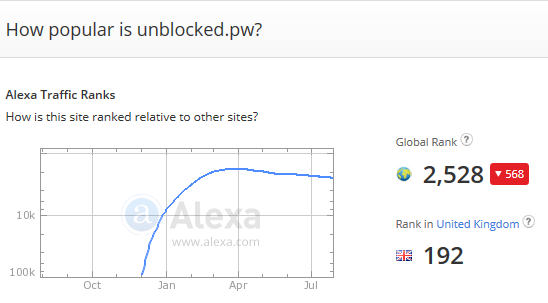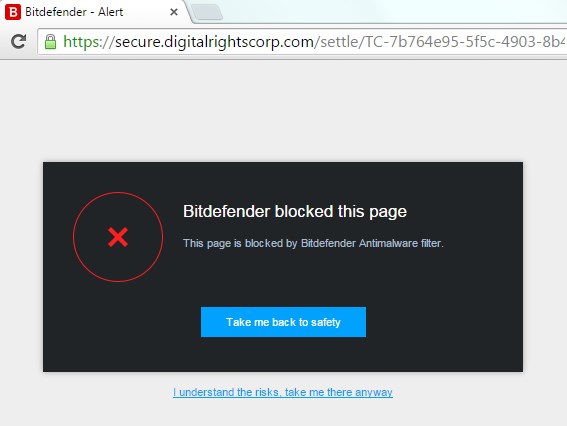Anti-Web Blocking Site More Popular in the UK than Spotify & Skype
dimanche 2 août 2015 à 10:48 For citizens of the UK, web blocking is becoming a hot topic. Aside from the large and growing list of torrent, streaming and other downloading sites currently blocked by ISPs, netizens are now facing the specter of government enforced porn barriers.
For citizens of the UK, web blocking is becoming a hot topic. Aside from the large and growing list of torrent, streaming and other downloading sites currently blocked by ISPs, netizens are now facing the specter of government enforced porn barriers.
That’s according to Prime Minister David Cameron, who this week fired off a broadside against adult content providers who he says are failing to control what other people’s children are viewing online.
“Our one nation government is working hard to make the internet a safer place for children, the next step in this campaign is to curb access to harmful pornographic content which is currently far too widely available,” the Prime Minister said. “I want to see age restrictions put into place or these websites will face being shut down.”
According to the government the UK’s top 10 adult sites account for over half (52%) of all site views so this is no trivial matter. The site’s aren’t mentioned by name so TF decided to look them up.
The most popular within the UK’s top 200 most-visited sites according to Alexa are Pornhub (#41), XHamster (#44), Xvideos (#47), RedTube (#92), TubeCup (#105) and YouPorn (#122). To give an idea of scale, PornHub is more popular than Netflix and YouPorn is more visited than Vimeo.
However, while compiling this list we stumbled across something else that’s both surprising on one hand and utterly predictable on the other. Occupying the position of the UK’s 192nd most-visited site is Unblocked.pw, a service entirely dedicated to unblocking blocked websites.
Breaking the top 200 is no mean feat for any site, especially when one considers the competition at that level. Nevertheless, after existing for much less than a year, Unblocked.pw is already more popular in the UK than both Spotify (#194) and Skype (#195).

While the skill of the site’s operator is no doubt a factor in its success, the huge popularity of Unblocked.pw is almost entirely down to restrictions being put in place by UK Internet service providers. Every time a blockade is put in place, Unblocked.pw provides a solution to the problem. It currently unblocks most major torrent and streaming sites plus the specialist ebook archives targeted in May.
“Fighting censorship has been the primary motivation behind running Unblocked,” the site’s operator informs TorrentFreak.
“It’s to show that whatever regulators do to censor things online, there will always be a way around it. The initial motivation came from when The Pirate Bay was blocked in the Netherlands. We set up Proxybay.co to maintain a list of Pirate Bay proxy sites and show people how to create their own.”
In respect of porn sites, Cameron’s office suggests that users could be required to validate their ages with a credit card, but the operators of overseas ‘tube’ sites will be extremely reluctant to introduce such measures since they will mess with their business models by reducing traffic and ad revenue.
That will leave web-blocking as Cameron’s only other option but as highlighted by the Open Rights Group, that won’t work.
“While the government can shut down UK-based sites, these are few in number and represent a tiny proportion of the global porn industry. Cameron needs to clarify how he wishes to achieve his goals, given that most porn sites are hosted abroad,” says ORG’s Jim Killock.
“To block them, the government would have to introduce a national firewall, which would censor sites for everyone, and would likely be widely circumvented.”
While there are currently no dedicated adult sites in Unblocked.pw’s repertoire (since none are currently blocked in the UK), there can be little doubt that if the UK government decides to order blockades, Unblocked and similar sites will quickly offer wordarounds.
If that does indeed transpire, expect a successful service to break the top 50 most-visited sites in the country while jockeying for rankings with the likes of Apple and WordPress. It’s a battle the government simply can’t win, but that won’t stop them from trying.
In the meantime the Internet continues to interpret censorship as damage, and routes around it.
Source: TorrentFreak, for the latest info on copyright, file-sharing, torrent sites and the best VPN services.
 Piracy monetization firm Rightscorp has made several headlines recently, often because of its aggressive attempts to obtain settlements from allegedly pirating Internet users.
Piracy monetization firm Rightscorp has made several headlines recently, often because of its aggressive attempts to obtain settlements from allegedly pirating Internet users.
 While the diminishing revenues of the major recording labels have been a hot topic for many years, it’s only relatively recently that the debate over artists’ earnings has found itself almost constantly in the news.
While the diminishing revenues of the major recording labels have been a hot topic for many years, it’s only relatively recently that the debate over artists’ earnings has found itself almost constantly in the news. Hoping to revolutionize live broadcasting on the Internet, Bram Cohen
Hoping to revolutionize live broadcasting on the Internet, Bram Cohen  There can be little doubt that one of the most-favored anti-piracy mechanisms of the past several years is that of site-blocking. Rather than tackling sites head on with expensive legal action, rightsholders have domains blocked at the ISP level with the aim of diminishing ease of access and reducing direct traffic.
There can be little doubt that one of the most-favored anti-piracy mechanisms of the past several years is that of site-blocking. Rather than tackling sites head on with expensive legal action, rightsholders have domains blocked at the ISP level with the aim of diminishing ease of access and reducing direct traffic.